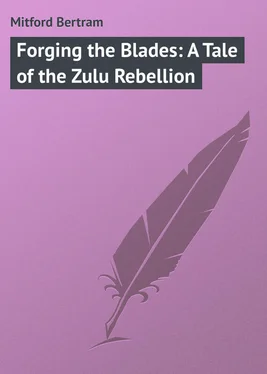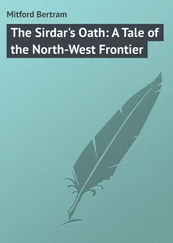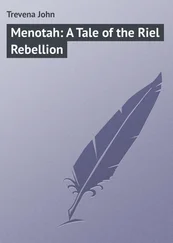Bertram Mitford - Forging the Blades - A Tale of the Zulu Rebellion
Здесь есть возможность читать онлайн «Bertram Mitford - Forging the Blades - A Tale of the Zulu Rebellion» — ознакомительный отрывок электронной книги совершенно бесплатно, а после прочтения отрывка купить полную версию. В некоторых случаях можно слушать аудио, скачать через торрент в формате fb2 и присутствует краткое содержание. Жанр: foreign_prose, на английском языке. Описание произведения, (предисловие) а так же отзывы посетителей доступны на портале библиотеки ЛибКат.
- Название:Forging the Blades: A Tale of the Zulu Rebellion
- Автор:
- Жанр:
- Год:неизвестен
- ISBN:нет данных
- Рейтинг книги:4 / 5. Голосов: 1
-
Избранное:Добавить в избранное
- Отзывы:
-
Ваша оценка:
- 80
- 1
- 2
- 3
- 4
- 5
Forging the Blades: A Tale of the Zulu Rebellion: краткое содержание, описание и аннотация
Предлагаем к чтению аннотацию, описание, краткое содержание или предисловие (зависит от того, что написал сам автор книги «Forging the Blades: A Tale of the Zulu Rebellion»). Если вы не нашли необходимую информацию о книге — напишите в комментариях, мы постараемся отыскать её.
Forging the Blades: A Tale of the Zulu Rebellion — читать онлайн ознакомительный отрывок
Ниже представлен текст книги, разбитый по страницам. Система сохранения места последней прочитанной страницы, позволяет с удобством читать онлайн бесплатно книгу «Forging the Blades: A Tale of the Zulu Rebellion», без необходимости каждый раз заново искать на чём Вы остановились. Поставьте закладку, и сможете в любой момент перейти на страницу, на которой закончили чтение.
Интервал:
Закладка:
“What is the news?” asked the chief at last.
“News?” echoed Verna, flashing at him a bright glance of merriment. “Now what, I would ask, could have happened here that a great chief such as Sapazani would care to hear about?”
“That I know not, unless that it came from the lips of Izibu ,” he answered, with a merry twinkle in his eyes.
It is not as a rule respectful for a native to address the superior white by his or her nickname. But “Izibu” – meaning water-lily – Verna considered rather pretty and poetic, and did not discourage its use. Moreover, she had been accustomed to natives all her life, and understood them thoroughly. She appreciated, too, the position of her father and herself among this once kingly race, where they dwelt in perfect security as to person and property, so much so that they never troubled to put a lock on anything, not even on the trading store. Now she laughed gaily at the compliment which had accompanied the use of the name, and went on chatting, easily, merrily, even banteringly – that to any one unaware of the stern and rigid line of demarcation in such matters, between white and coloured, which has ever saturated public opinion throughout South Africa, it might have seemed that she was carrying on a sort of mild flirtation with this splendid savage. The latter had produced his snuff-box, and was absorbing a portion of its contents in grave silence.
“But I am forgetting!” exclaimed Verna. “The day is hot, and a visitor must not go away without food and drink.”
“Why, as to the last it will be good,” answered the chief, with a sparkle in his fine eyes. “For the first, I am not hungry.”
Herein again in this detail the man differed from his up-to-date countryman, who will seldom, if ever, refuse anything offered.
Verna rose and went into the house, returning with a large bottle of the excellent ale they brew in Maritzburg, and a long glass.
“Good!” exclaimed the guest, as he drained the foaming brew. “ Wou ! Our people cannot make such tywala as this.” The while he had been noting, with calm approval, every movement of the girl: the fine erectness of her carriage, the firm walk, straight from the hips. As he talked he noted, too, the quick movements of her floury hands and arms, for she had resumed her occupation. At last he rose to take leave. The sun was getting low, he said, and he had still far to travel.
“Wait,” said the girl. Then she walked round to the store, returning immediately with a few unconsidered trifles, such as a large sheath-knife and belt, a packet of snuff and some brass buttons, also strings of beads.
“This is something that even a chief may find useful,” she said, handing him the knife, which he accepted with a pleasant murmur of thanks. “These,” she went on, handing him the smaller things, “will please Nonente and Malima,” naming two of Sapazani’s youngest and favourite wives.
These, too, he took. Verna, putting up both hands to adjust the pins in the large and rather untidy knot of brown hair at the back of her well-shaped head, stood contemplating him with a flash of roguish mischief in her eyes; the joke being that she was morally compelling so great a chief as Sapazani to carry something, however small, for a couple of mere women. But she reckoned without that potentate’s power of resource.
“Ho, Samhlu!” he called to the stable boy, who was passing, and now turned hurriedly, obsequiously.
“Thou wilt bear these behind me,” said Sapazani, handing him the other things. Then, unconcernedly belting the knife round his own exalted person, he took a pleasant farewell of his very attractive entertainer, and, followed by the boy, who was one of his own people, strode away over the veldt.
Verna, looking after him, laughed to herself. Her guest had not merely – and readily – cut the knot of his own dilemma, but had turned the tables on her by depriving her of the services of her boy for the rest of the day. But she thoroughly enjoyed the joke. Soon the tramp of hoofs struck upon her ear, and she turned with a smile of welcome to meet her father.
“Well, girlie, and what have you been doing with yourself? Busy as usual?” sung out the latter, as he swung himself from his horse and shouted for the boy.
“Yes; bread-making. But it’s no use calling Samhlu, dear. You won’t see him again to-day, because he’s gone with Sapazani to carry five strings of beads and a couple of dozen brass buttons, which that debilitated weakling was too feeble to carry himself.”
“Sapazani? Has he been here, then? Pity I missed him.”
“Just gone.” And then she told him about her little bit of innocent mischief, at which the trader threw back his head and roared with laughter.
“You mustn’t play tricks on these big swells, darling,” he said, proceeding to do his own off-saddling. “But Sapazani’s a real good ’un, bang the opposite of his crusty, slippery old father.”
Ben Halse was a tall, fine-looking man, with a large beard; just the sort of man to command the respect of savages; in his dealings with whom he was invariably straight and reliable. But as a setoff against this there were stories about him – stories of shady transactions in the gun-running and liquor-smuggling line, and those in charge of the administration of the country held him in no very favourable regard. Indeed, it was whispered that there was one even darker count against him, which, though a thing of a tolerably remote past, the law might take cognisance of even yet. But all these things, although known to Verna, made no difference in the affection and confidence which existed between the two. Of her – his only child – he was inordinately fond and proud; and, so far as he was concerned, desired nothing more to complete his happiness in life.
But she? In the full vitality of her splendid youth, was she not bound to “pair”? This was a question he frequently asked himself, and – it needed no answer.
Chapter Four.
The Trading Store
Ben Halse’s store was full of native women, some with babies and some without; and all were chattering. Two or three had come there to do a deal, and the rest had come to see them do it.
“ Au ! but this is not the right kind,” muttered one, with a dissatisfied shake of the head, holding up a blue skirt; the others joining critically in its examination. “I want one red and striped, not spotted like this.”
“Here it is, then,” cheerfully returned Verna, producing another. She was presiding goddess on this occasion, as indeed she often was.
But the other, although red and striped, did not seem to please. It was examined critically by the whole committee, except one or two, who, squatted on the floor, were giving undivided attention and, incidentally, nutriment to their infants. The stripes were white instead of yellow, and they ought to be yellow. No white things were worn now.
Verna laughed good-humouredly. She knew her customers. No deal was ever effected with such without seemingly endless discussion – and objections.
“No white things!” she echoed. “Why, I wear white things.”
“ Inkosikazi !”
“Well, why not you?”
“ Au !” and the intending buyer brought a hand to her mouth with a smothered laugh. “Inkosikazi does not belong to the chief.”
“The chief. What chief?”
“U’ Sapazani.”
“Sapazani?” rejoined Verna. “But he does not like the clothing of white people at all. Yet you are buying it.”
This was a fact. Though on terms of friendship with Ben Halse Sapazani was anything but fond of the trader’s compatriots, and discouraged as far as he could the introduction of European customs and clothing. With the latter, in consequence, the store was but scantily supplied.
Читать дальшеИнтервал:
Закладка:
Похожие книги на «Forging the Blades: A Tale of the Zulu Rebellion»
Представляем Вашему вниманию похожие книги на «Forging the Blades: A Tale of the Zulu Rebellion» списком для выбора. Мы отобрали схожую по названию и смыслу литературу в надежде предоставить читателям больше вариантов отыскать новые, интересные, ещё непрочитанные произведения.
Обсуждение, отзывы о книге «Forging the Blades: A Tale of the Zulu Rebellion» и просто собственные мнения читателей. Оставьте ваши комментарии, напишите, что Вы думаете о произведении, его смысле или главных героях. Укажите что конкретно понравилось, а что нет, и почему Вы так считаете.












